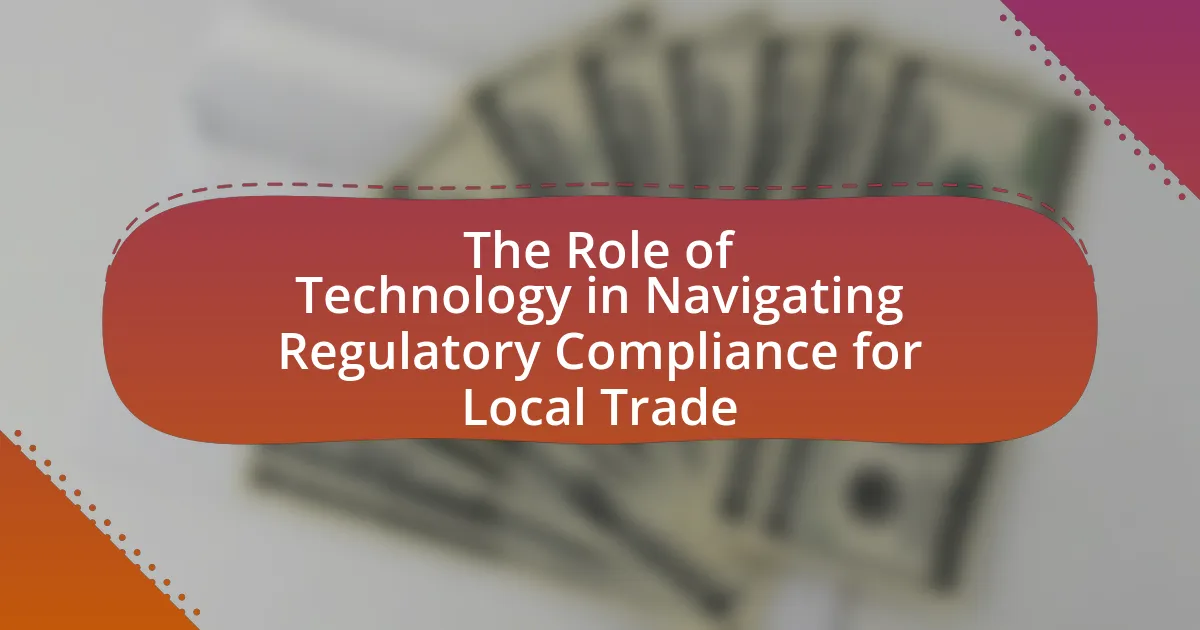Local trade regulations are laws and guidelines established by local governments to govern trade practices within their jurisdictions, encompassing licensing requirements, zoning laws, health and safety standards, and tax obligations. These regulations vary significantly across regions due to economic conditions, cultural practices, and legal frameworks, influencing market entry strategies and competition among businesses. Key components include licensing, taxation policies, and compliance standards, which shape the operational landscape for businesses. Understanding and navigating these regulations is crucial for compliance, fair competition, and successful business operations, as they directly impact pricing, consumer choices, and overall market dynamics.

What are Local Trade Regulations?
Local trade regulations are laws and guidelines established by local governments to govern trade practices within their jurisdictions. These regulations can include licensing requirements, zoning laws, health and safety standards, and tax obligations that businesses must adhere to in order to operate legally. For example, in the United States, local trade regulations vary significantly from one municipality to another, reflecting the unique economic and cultural contexts of each area. This variability underscores the importance of understanding specific local regulations for compliance and successful business operations.
How do Local Trade Regulations vary across different regions?
Local trade regulations vary significantly across different regions due to factors such as economic conditions, cultural practices, and legal frameworks. For instance, in the European Union, trade regulations are often harmonized to facilitate a single market, while in the United States, regulations can differ widely between states, reflecting local economic priorities and business environments. Additionally, developing countries may have less stringent regulations aimed at encouraging foreign investment, contrasting with more developed nations that enforce stricter compliance measures. These variations are evident in areas such as tariffs, import/export restrictions, and licensing requirements, which can impact businesses’ operational strategies and market entry decisions.
What factors influence the differences in Local Trade Regulations?
Differences in local trade regulations are influenced by economic conditions, cultural values, political structures, and legal frameworks. Economic conditions, such as the level of development and market size, dictate the regulatory environment to promote growth and protect local businesses. Cultural values shape consumer behavior and business practices, leading to variations in regulations that reflect local norms. Political structures, including the degree of government intervention and stability, affect how regulations are formulated and enforced. Legal frameworks, which encompass existing laws and compliance mechanisms, further contribute to the diversity in trade regulations across regions. For instance, countries with strong legal systems tend to have more structured trade regulations compared to those with weaker legal frameworks.
How do cultural and economic contexts shape Local Trade Regulations?
Cultural and economic contexts significantly shape local trade regulations by influencing the values, priorities, and practices that govern trade within a community. For instance, in cultures that prioritize collective well-being, regulations may focus on equitable distribution and support for local businesses, as seen in Scandinavian countries where cooperative models are prevalent. Economically, regions with robust industries may implement regulations that favor innovation and competition, such as tax incentives for startups in Silicon Valley, which fosters a dynamic business environment. These contexts dictate not only the formulation of regulations but also their enforcement and adaptation over time, reflecting the unique socio-economic landscape of each region.
Why are Local Trade Regulations important for businesses?
Local trade regulations are important for businesses because they establish the legal framework within which companies operate, ensuring compliance with local laws and standards. These regulations help maintain fair competition, protect consumer rights, and promote economic stability by setting guidelines for pricing, quality, and safety. For instance, businesses that adhere to local trade regulations can avoid legal penalties and enhance their reputation, which is crucial for customer trust and loyalty. Additionally, according to the World Bank, countries with clear and enforced trade regulations experience higher levels of foreign investment, indicating that such regulations are vital for attracting business opportunities and fostering economic growth.
What impact do Local Trade Regulations have on market entry strategies?
Local trade regulations significantly influence market entry strategies by dictating the legal framework within which businesses operate. These regulations can impose tariffs, quotas, and licensing requirements that affect the cost and feasibility of entering a new market. For instance, a study by the World Bank in 2020 indicated that countries with stringent trade regulations often see reduced foreign direct investment, as companies weigh the complexities and costs associated with compliance. Additionally, local regulations can necessitate adaptations in product offerings and marketing strategies to align with regional standards, further shaping how businesses approach market entry.
How do Local Trade Regulations affect competition among businesses?
Local trade regulations significantly influence competition among businesses by establishing rules that can either promote or hinder market entry and operational practices. For instance, stringent licensing requirements can create barriers for new entrants, reducing competition and allowing established firms to maintain higher prices. Conversely, regulations that encourage fair trade practices can enhance competition by ensuring a level playing field, enabling smaller businesses to compete effectively against larger corporations. Evidence from the World Bank’s “Doing Business” report indicates that regions with more streamlined regulatory environments tend to experience higher levels of business activity and competition, as lower compliance costs facilitate market entry and innovation.

What are the key components of Local Trade Regulations?
The key components of Local Trade Regulations include licensing requirements, taxation policies, zoning laws, and compliance standards. Licensing requirements dictate the necessary permits for businesses to operate legally within a locality, ensuring that they meet specific operational criteria. Taxation policies outline the local taxes applicable to businesses, which can vary significantly across regions, impacting profitability and operational decisions. Zoning laws regulate land use and determine where certain types of businesses can be established, influencing local economic development. Compliance standards encompass health, safety, and environmental regulations that businesses must adhere to, ensuring public welfare and sustainability. These components collectively shape the business environment and operational landscape within a locality.
How do licensing and permits function within Local Trade Regulations?
Licensing and permits serve as essential mechanisms within local trade regulations by establishing legal frameworks that govern business operations. These regulations ensure that businesses comply with safety, health, and zoning standards, thereby protecting consumers and the community. For instance, a study by the International Trade Centre highlights that effective licensing processes can enhance market access and promote fair competition by ensuring that only qualified entities operate within a jurisdiction. Additionally, local governments often require specific permits for various activities, such as construction or food service, to monitor compliance and enforce regulations effectively. This structured approach not only facilitates orderly trade but also fosters economic development by creating a predictable business environment.
What types of licenses are commonly required for local trade?
Commonly required licenses for local trade include business licenses, sales tax permits, health permits, and zoning permits. Business licenses are essential for legal operation within a municipality, while sales tax permits allow businesses to collect sales tax from customers. Health permits are necessary for businesses involved in food service or health-related services, ensuring compliance with health regulations. Zoning permits confirm that the business location adheres to local zoning laws, which dictate the types of activities allowed in specific areas. These licenses vary by region and are critical for lawful business operations.
How do permit requirements differ by region?
Permit requirements vary significantly by region due to differences in local laws, economic conditions, and regulatory frameworks. For instance, in the United States, states like California have stringent environmental permits for construction projects, while states like Texas may have more lenient regulations. Additionally, European countries often require multiple permits for business operations, reflecting their complex regulatory environments, whereas regions in developing countries may have fewer requirements but less enforcement. These variations are influenced by factors such as population density, industrial activity, and local governance structures, which shape the specific permit processes and requirements in each area.
What role do tariffs and taxes play in Local Trade Regulations?
Tariffs and taxes are critical components of local trade regulations as they directly influence the cost of imported goods and the competitiveness of local industries. Tariffs impose additional costs on imported products, which can protect domestic businesses by making foreign goods more expensive, thereby encouraging consumers to purchase locally produced items. For example, the United States imposed tariffs on steel imports to support its domestic steel industry, resulting in increased prices for imported steel but also protecting local jobs. Taxes, such as sales taxes or value-added taxes, further regulate trade by affecting the final price consumers pay, which can influence purchasing decisions and overall market dynamics. These financial mechanisms are essential for governments to control trade flows, generate revenue, and implement economic policies that align with national interests.
How do tariffs affect pricing and consumer choices?
Tariffs increase the cost of imported goods, leading to higher prices for consumers. When tariffs are imposed, importers typically pass on the additional costs to consumers, resulting in elevated retail prices. For example, a study by the Peterson Institute for International Economics found that the tariffs imposed during the U.S.-China trade war raised prices for American consumers by approximately $1,200 per year for a typical family. Consequently, consumers may alter their purchasing decisions, opting for domestically produced goods or lower-priced alternatives, thereby affecting overall market dynamics and consumer behavior.
What are the implications of tax regulations on local businesses?
Tax regulations significantly impact local businesses by influencing their operational costs, pricing strategies, and overall profitability. For instance, higher tax rates can reduce disposable income for consumers, leading to decreased sales for local businesses. Additionally, compliance with complex tax regulations can incur administrative costs, diverting resources away from core business activities. According to a study by the National Federation of Independent Business, 30% of small business owners cite taxes as a major concern affecting their growth. Furthermore, tax incentives or credits can encourage investment and expansion, while unfavorable tax policies may drive businesses to relocate to regions with more favorable tax environments.

How can businesses navigate Local Trade Regulations effectively?
Businesses can navigate local trade regulations effectively by conducting thorough research on the specific laws and requirements in their operating regions. This involves understanding local licensing, tariffs, and compliance standards that vary significantly across different jurisdictions. For instance, a study by the World Bank indicates that countries with streamlined regulatory processes, such as Singapore, have higher ease of doing business rankings, which highlights the importance of adapting to local regulations for operational efficiency. Additionally, engaging with local legal experts and trade associations can provide valuable insights and updates on regulatory changes, ensuring that businesses remain compliant and competitive in their respective markets.
What strategies can businesses employ to comply with Local Trade Regulations?
Businesses can employ several strategies to comply with local trade regulations, including conducting thorough research on applicable laws, implementing compliance training programs, and establishing robust internal controls. Researching local laws ensures that businesses understand specific requirements, such as licensing, tariffs, and import/export restrictions. Compliance training programs educate employees about these regulations, fostering a culture of adherence within the organization. Additionally, robust internal controls, such as regular audits and compliance checks, help identify and rectify potential violations before they escalate. These strategies are essential for minimizing legal risks and maintaining operational integrity in various regions.
How can businesses stay updated on changes in Local Trade Regulations?
Businesses can stay updated on changes in local trade regulations by subscribing to government newsletters and industry publications that provide timely updates. These resources often include official announcements, regulatory changes, and compliance guidelines, ensuring that businesses are informed about the latest legal requirements. For instance, the U.S. Small Business Administration and local chambers of commerce frequently publish updates that are crucial for compliance. Additionally, attending industry conferences and workshops can provide insights into upcoming regulatory changes and best practices for adaptation.
What resources are available for understanding Local Trade Regulations?
Resources available for understanding Local Trade Regulations include government websites, trade associations, and legal databases. Government websites, such as those of local chambers of commerce or trade departments, provide official guidelines and regulatory frameworks specific to regions. Trade associations often publish reports and offer seminars that detail industry-specific regulations. Legal databases, like Westlaw or LexisNexis, contain comprehensive legal texts and case law that can clarify local trade laws. These resources collectively ensure that businesses and individuals can access accurate and relevant information regarding local trade regulations.
What best practices should businesses follow regarding Local Trade Regulations?
Businesses should ensure compliance with local trade regulations by conducting thorough research and staying updated on relevant laws. This involves regularly reviewing local, state, and federal regulations that impact their operations, as non-compliance can lead to significant penalties. For instance, according to the U.S. Small Business Administration, businesses that fail to adhere to local regulations may face fines or even closure. Additionally, engaging with local trade associations can provide valuable insights and resources to navigate complex regulatory environments effectively.
How can businesses build relationships with local regulatory bodies?
Businesses can build relationships with local regulatory bodies by engaging in consistent communication and collaboration. Establishing regular dialogue through meetings, forums, and public consultations allows businesses to understand regulatory expectations and share their insights. For instance, companies that participate in local chambers of commerce often gain access to valuable information about regulatory changes and can voice their concerns effectively. Additionally, demonstrating compliance with regulations and actively seeking feedback fosters trust and credibility. Research indicates that businesses that maintain open lines of communication with regulators are more likely to navigate compliance challenges successfully, as evidenced by a study from the International Journal of Business and Management, which highlights the positive correlation between proactive engagement and regulatory outcomes.
What common pitfalls should businesses avoid when dealing with Local Trade Regulations?
Businesses should avoid the pitfalls of non-compliance, lack of research, and inadequate record-keeping when dealing with local trade regulations. Non-compliance can lead to fines and legal penalties, as evidenced by the fact that businesses face an average of $1.5 million in penalties annually due to regulatory violations. Lack of research can result in misunderstandings of local laws, which vary significantly across regions; for instance, a study by the World Bank highlights that businesses in regions with stringent regulations often fail to adapt, leading to operational disruptions. Inadequate record-keeping can hinder a business’s ability to demonstrate compliance during audits, which can be detrimental, as regulatory bodies increasingly rely on documentation to assess adherence to local laws.




